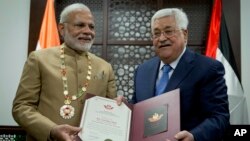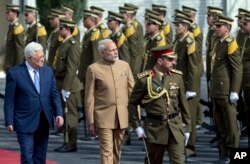Indian Prime Minister Narendra Modi expressed support Saturday in Ramallah for an independent Palestine and said he hoped for the return of peace to the region, while Palestinian President Mahmoud Abbas called on India to support multicountry sponsorship of future Israeli-Palestinian negotiations.
Modi's three-hour stop in Ramallah, the first by an Indian prime minister, was being seen as New Delhi's bid to balance its blossoming ties with Israel.
Saying that Palestinians were ready to engage in dialogue, Abbas said he was counting on India's support for negotiations between Israel and Palestine. "The formation of a multilateral mechanism that stems or is produced by international peace convention is the most ideal way to broker such negotiations," he said.
Jerusalem status
Since U.S. President Donald Trump recognized Jerusalem as Israel's capital in December, Abbas has been seeking international support for countries from Europe and the Middle East to be included as mediators between Palestine and Israel — efforts that the U.S. has led. But so far, he has failed to win such commitments.
After holding talks with Abbas, Modi said he had assured the Palestinian leader that "India is bound by a promise to take care of Palestinian people's interests. India hopes that soon Palestine will become a free country in a peaceful manner."
The two sides signed six agreements worth nearly $50 million in areas such as health, agriculture, information technology and education as Modi sought to emphasize New Delhi's commitment as a development partner for Palestinians. The agreement includes building a specialty hospital, three schools and the construction of a center for empowering women.
Modi came to Ramallah via Jordan as New Delhi sought to emphasize that it wants its relations with Palestinians and Israel to be mutually independent and exclusive, or in the words of India's foreign ministry officials, "de-hyphenated."
Early backer
New Delhi was one of the earliest and staunchest supporters of the Palestinian cause and has traditionally voted in its favor at international forums. In December, India backed a U.N. resolution that opposed the U.S. decision to recognize Jerusalem as Israel's capital.
India and Israel have drawn closer in recent years, however, partly because of common concerns about Islamic terrorism. And Modi has openly embraced their growing strategic partnership, hosting the Israeli prime minister in New Delhi three weeks ago after making a high-profile visit to Tel Aviv last July. Israeli Prime Minister Benjamin Netanyahu has called the India-Israeli partnership "a marriage made in heaven."
Analysts say that although India wants its relations with the two countries to be independent of each other, the tilt is toward Israel, which is now among the top defense suppliers to New Delhi.
Modi also is set to visit Oman and the United Arab Emirates.
The Indian leader said that building good relations with the Gulf countries is a key priority. Not only does India import much of its oil from the Middle East, but Modi is also wooing these countries for much-needed investments, especially the UAE, which has committed billions of dollars in sectors such as health care and infrastructure.





